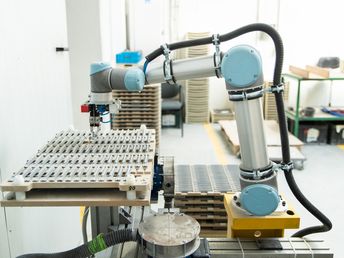"The UR collaborative robots can work side by side with a human and don’t require continuous control. The team of engineers is devoted to programming, whereas a person directly collaborating with the robot is the operator who delivers and picks pallets with processed elements,” says Rafał Sienkiewicz, Process Engineer in AQUAEL plant in Suwałki.
AQUAEL was able to install the UR5 in a small area that didn’t require any additional conveyors. “We simply place the cobot on the production table right next to the working employee. UR is fully safe and the programming of the first task took us only few minutes,” says Arkadiusz Soroka.





